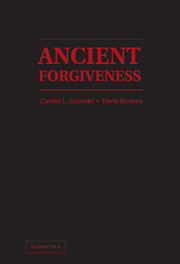Book contents
- Frontmatter
- Contents
- Contributors
- Preface
- Part I The Territory Philosophically Considered
- II Forgiveness Among The Greeks
- 2 Assuaging Rage
- 3 Achilles, Psammenitus, and Antigone
- 4 All in the Family
- Part III Forgiveness Among The Romans
- Part IV Judaic And Christian Forgiveness
- Bibliography of Works Cited
- Index
2 - Assuaging Rage
Remorse, Repentance, and Forgiveness in the Classical World
from II - Forgiveness Among The Greeks
Published online by Cambridge University Press: 05 January 2012
- Frontmatter
- Contents
- Contributors
- Preface
- Part I The Territory Philosophically Considered
- II Forgiveness Among The Greeks
- 2 Assuaging Rage
- 3 Achilles, Psammenitus, and Antigone
- 4 All in the Family
- Part III Forgiveness Among The Romans
- Part IV Judaic And Christian Forgiveness
- Bibliography of Works Cited
- Index
Summary
Forgiveness is a variable human process and a practice with culturally distinctive versions.
Did the ancient Greeks and Romans forgive? In this chapter, I argue that they did not – at least not in the sense that the term commonly bears today, according to which we forgive someone who has wronged us and who expresses sincere remorse for her or his behavior. This is not to fault the ancients: they had, as we shall see, other strategies of reconciliation. But forgiveness in the full moral (and modern) sense of the word was not among them; for where we are inclined to seek confession and apology, they looked rather to excuse or exculpation.
In the second book of Aristotle’s Rhetoric, which provides the most extensive analysis of the emotions that has survived from ancient Greece, the first emotion to be examined in detail is anger (orgē); following this, Aristotle devotes a section to praotēs or praünsis, “calmness” or “calming down,” which he treats as the emotion opposite to anger. As many critics have observed, calmness does not sound much like an emotion; however, if we think of the pathē as responses to the behavior of others that have the effect of altering our judgments, which is the way Aristotle himself defines them (adding that they must be accompanied by pleasure and pain), then we can more easily see why the elimination of anger might also figure in Aristotle’s inventory of the passions.
- Type
- Chapter
- Information
- Ancient ForgivenessClassical, Judaic, and Christian, pp. 17 - 30Publisher: Cambridge University PressPrint publication year: 2011
- 3
- Cited by

